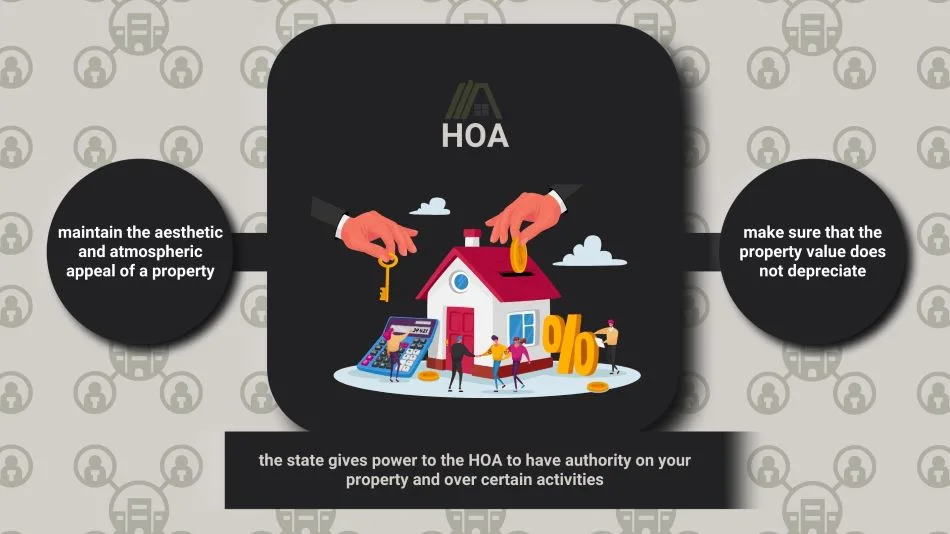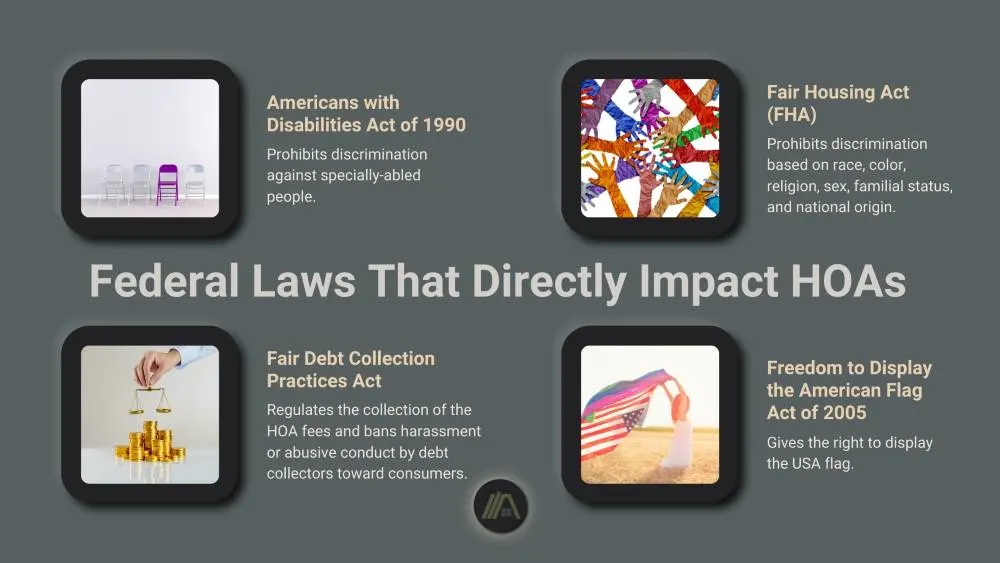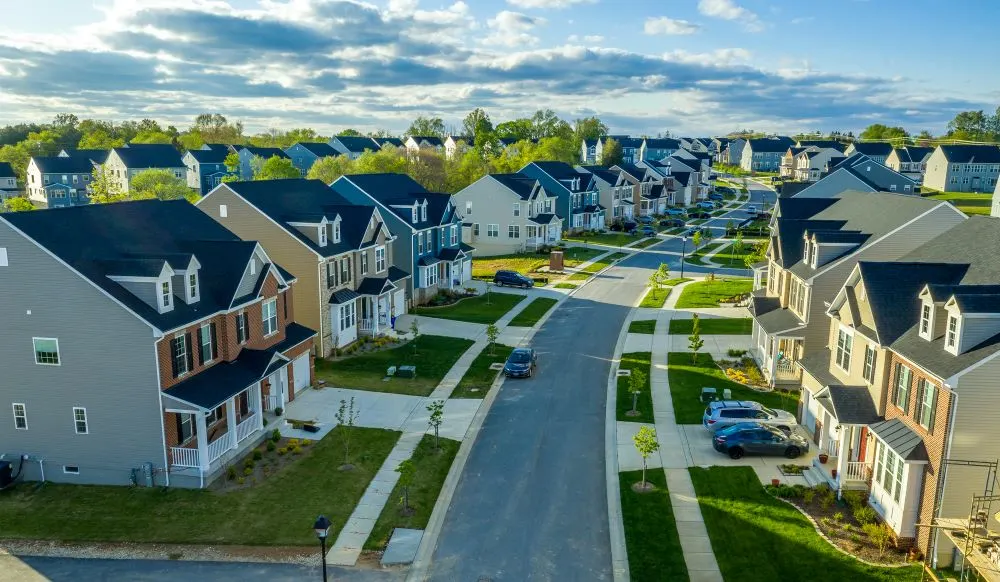HOAs are often portrayed as villains, and in some cases, they certainly do abuse their power. We hope this is the exception and not the rule, because the is, they do have the power.
HOAs are legal entities that exist to ensure the well-being of a neighborhood. As such, they are given power by the law, homeowners, and, in the case of corporate HOAs, money. However, there is a limit to their power and if your rights as a human being, a citizen, and a homeowner are being unfairly compromised, you have the power to stand up to them.

There are laws handing over a measure of power to HOAs. When you move into an HOA, you sign documents giving them power. Corporate HOAs have money, making any fight with a homeowner unfair. If you are not aware of your rights (CC&Rs), you give HOAs the power to abuse their position.
The Law Gives Power to HOAs
In a way, your HOA is a ‘mini government’. Just like the government, your HOA can implement rules, collect fees, regulate behavior, hold elections, and impose a hefty fine on you for violating the HOAs’ set rules.
One of the reasons why HOAs have so much power is because the law gives them this power. Most state laws give legal powers to HOAs so that they can implement community policies that ensure peace and integrity in a planned development.
The primary function of HOA is to maintain the aesthetic and atmospheric appeal of a property and make sure that the property value does not depreciate. For this, the state gives power to the HOA to have authority on your property and over certain activities.
HOAs are given the power to make rules, but not to use them for any variant of personal gain. Homeowners across several states find themselves in a tight spot because of their HOA. From mishandling of HOA funds to victimizing homeowners, there are some serious allegations against HOAs.
What baffles homeowners everywhere is how HOAs are allowed by the law to have so much power and authority over someone else’s property. “Home” is supposed to be peaceful but for some, their home becomes the cause of so much tension and frustration.
11 Alive phrase it best:
“Right now, state law gives all the power to the HOA board, to interpret covenants in ways that don’t always make sense to homeowners.”

Late Dues Can Lead to Liens and Fines
As a homeowner living in a community regulated by HOA, you owe regular HOA fees that cover maintenance of the development. HOA fees are used to pay for snow removal, security, repairs and maintenance for common facilities, the salary of HOA employees, etc.
Sometimes, for major renovations or improvements, HOAs levy special assessments on homeowners. When HOA fees, special assessments, or violation fines levied are not paid on time, your HOA can place a lien on your house. They can even foreclose on your property!
It is unlikely that they will take this drastic step, but it is good to be informed.
Take a Detour
Can HOA Kick You Out Of Your House
Exact Legal Power Varies
The legal powers of HOA depend on the way the HOA was formed. In upscale developments, HOAs are formed as non-profit organizations and have immense power over the homeowners and the property.
All HOAs are formed as separate legal entities and their power varies. HOAs are given the power to enforce rules related to rentals, guests, structural renovations, choice of paint for the exterior, pets, landscaping, etc.
Examples of Legislation Giving HOAs Power
State legislatures giving power to the HOA varies according to the state.
- In Alabama, the Alabama Homeowners’ Association Act governs the formation, management, powers, and operation of residential homeowners’ associations.
- In California, it is the Davis-Stirling Common Interest Development Act.
- In Pennsylvania, it is Pennsylvania Uniform Condominium Act and Pennsylvania Uniform Planned Community Act.
- In Mississippi, it is Mississippi Condominium Law.
Along with state laws, HOAs are also governed by federal laws like The Americans with Disabilities Act of 1990 that prohibits discrimination against specially-abled people, The Fair Housing Act (FHA), Over-the-Air Reception Devices Rule (OTARD), etc.
Moving in Gives HOAs Power
A home is a long-term investment that you make after taking lots of factors into consideration. One of them is the future value of your property. Purchasing a home in an HOA community is a way of ensuring that the price of your property will increase.
Along with this benefit, buying a home in an HOA-ruled property inevitably means becoming a member of the HOA. When you move in you sign a legally binding contract saying that you will adhere to all the Covenants, Conditions, and Restrictions (CC&Rs).
Whether you like it or not, after moving in you are legally committed to the responsibilities given to the homeowners by the HOA. Different HOAs have different rules. But most HOAs have a common set of covenants and rules about things like occupancy limits, renting, parking, holiday decorations, etc.
As a resident of the HOA, you will have to abide by the HOA laws unless you want to be fined. In a way, when you move in, you give HOA the power to enforce rules that you are expected to follow.
Take a Detour
Can HOA Tell You What to Do Inside Your House
Can HOA Restrict Guests (Know your rights)
Corporate HOAs Have Money on Their Side
An HOA is formed as a separate legal entity and is governed by state statutes that apply to non-profit organizations. But if your HOA is a corporation, then by default, they have more power.
When an HOA is professionally managed, it ends up having more resources and funds. The experts managing the HOA run it like a company and focus on making it a profitable venture.
A corporate HOA can be quite strict and can have access to more resources, making it difficult for you to fight with them. More often than not, this is nothing personal, “it’s just business.”
Ignorance Gives Power to HOAs
HOA Governing Documents
Before buying a property in an HOA community, read the governing documents carefully. Most HOAs will give you CC&Rs (also known as the HOA Declaration of Covenants, Conditions, and Restrictions), Articles of Incorporation, Bylaws, and Rules & Regulations. Each of these documents is important and serves a different objective.
CC&Rs are a legal contract that you have to sign while purchasing a property in an HOA community. This document states the rights of every resident, as well as the HOA.
The HOA Article of Incorporation has fundamental details like the association’s name, location, and purpose.
The Bylaws act more like a guideline that has the HOA processes of everyday operations and structure of the community.
Rules & Regulations contain community policies in detail.
Knowledge Is Power
When dealing with your HOA, the adage “knowledge is power” is very true.
In case of any conflict, these governing documents can help you to make your case. If your HOA is treating you unfairly or violating your rights, you can use the information in the governing documents to put your point across.
You must always have the latest and the most updated CC&Rs. If you don’t know the legal limitations of your HOA, they can easily take advantage of you.
State Law Overrides HOA
According to the legal hierarchy, your state law will always take precedence over HOA policies.
Legally, your HOA cannot enforce any law that violates the state law. If your HOA has enacted a law or a clause in your signed contract that infringes upon your basic constitutional and common law rights as a homeowner, then you can hold the HOA responsible.
The first step to resolving conflicts with an HOA is to be acquainted with the state laws and the HOA policies.
Know Your Rights
The purpose of knowing the law and the HOA governing documents is to be aware of your rights as a homeowner.
Along with state laws, federal laws also apply to HOA. Several federal laws regulate the HOA functions and protect the homeowners and the general public.

Some of the federal laws that directly impact an HOA:
- Americans with Disabilities Act of 1990 prohibits discrimination against specially-abled people.
- The Fair Housing Act (FHA) prohibits discrimination based on race, color, religion, sex, familial status, and national origin.
- Fair Debt Collection Practices Act regulates the collection of the HOA fees and bans harassment or abusive conduct by debt collectors toward consumers.
- The Freedom to Display the American Flag Act of 2005 gives the right to display the USA flag.
If your HOA violates any federal law, then it will have to face severe consequences.
Knowing your rights not only helps you to protect them but also enables you to change or modify the HOA’s rules and regulations that are unfair, discriminatory, or violate your rights as a citizen.
Apart from having rights like the Right of Possession, the Right of Control, the Right of Exclusion, the Right of Enjoyment, and the Right of Disposition, you also have the legal right to question the HOA fees and special assessment and access HOA documents and financial reports.
If you are tired of your HOA and want to annoy them within your legal rights then check out this article for some easy and cool ways to give your HOA a hard time. Legally.
Choose Your Battles
Most HOAs would not want to get into a legal battle with homeowners. The primary reason being the exorbitant legal fees, but HOAs are also aware that aggravating one homeowner might lead to more residents joining in, and leading to complete mayhem.
You will be well-advised to avoid the hassle of lawsuits and try to sort out things in the most peaceful way. Firstly, if you have violated a rule, then the decent thing to do is to apologize and pay the fine.
You can also use the governing documents to object to a policy or defend your actions. You can choose to compose a formal letter, address this issue in the next meeting or just have a face-to-face discussion with the HOA professional.
Before starting a war against the HOA, it’s best to know exactly what your HOA can do and the extent it is willing to go.
In case of any rule violation, your HOA will impose a fine on you. If you don’t pay, your HOA will fine you repeatedly until you clear the fines. HOA has the power to add these unpaid fines or fees to your property tax bill.
If you don’t pay the fine after being told several times, then these unpaid fines can lead to your home being forced into foreclosure. Depending on the severity of the action, your HOA can also involve authorities.
HOAs Exist for 3 Main Reasons
HOAs serve many functions, which we will discuss shortly. However, their functions can be grouped into three purposes, which are what make HOAs a necessary evil—one that cannot be ignored.
While there are many reasons why HOAs are bad, these three purposes of the HOA show that they exist primarily to benefit the members of the community. Sometimes the execution of the functions to achieve these goals is poor or excessive, but at the root of it, HOAs are supposed to be a positive institution.
HOAs manage and upkeep the shared areas in a community. Any area that falls outside your property and is accessible to everyone living in the neighborhood is the responsibility of the HOA. Right from hiring certified professionals to ensuring the work is completed on time, the HOA is in charge of it all.

HOAs ensure that the areas around your house always look their best for the enjoyment of the homeowners and to promote healthy property values (more on this in the next section).
Without HOAs, common areas would otherwise be neglected or become a point of contention between neighbors who had differing views regarding what should be done with them, who should care for them, etc.
2. Protect and Promote Neighborhood Property Values
HOAs protect and promote the property values in the neighborhood.
A house will slowly lose value as it gets older as a result of natural wear and tear. Renovations, upgrades, and regular maintenance help to stave off this depreciation and make your house an investment. However, it’s not just your property that determines how much your house is worth. It is also the condition of the properties surrounding yours and the state of the neighborhood.
If you have hawkers setting up stands at the end of the road, or the belt of empty land running adjacent to the street is overgrown and littered, then your house can be as pristine and polished as the Palace of Versaille and you still won’t get your asking price. The same applies if your neighbor hasn’t painted their exterior walls since moving in fifteen years ago and they have old washers and boxes piled in a corner of the front yard.

Property values are one of the main driving forces for why HOAs are so ruthless when it comes to imposing strict provisions that regulate the exterior appearance of homes within the HOA-regulated premises. It’s very inconvenient when you cannot paint your house the color you want or when you get fined because your grass is too long, but think of all the ways that this same principle protects you and your investment.
Property values are also protected by the security that an HOA provides. Whether it’s key-card access booms or patrols from a reliable security company, safety is paramount to most buyers, and the HOA-organized security is a selling point for homeowners. Not to mention, you benefit from the presence of these measures while you live there.
When every home within the community looks good and is well-maintained and there is visible evidence of high-security measures, then the neighborhood property values remain stable or even increase. Thus, with steely resolve, your HOA protects the price of your property. This is why a home in HOA-regulated property sells faster than non-HOA communities.
3. Prevent or Mediate Neighbor Disagreements
When people live together in relatively close proximity, then there’s a chance of occasional (and in some cases, frequent) disagreements due to natural differences of opinion and lifestyles as well as plain old petty behavior. HOAs act as a mediator between neighbors to prevent these discords from escalating. They will attempt to make sure that the matter is resolved quickly, effectively, and amicably.
So, whenever there’s any disagreement, the HOA tries to find the middle ground to ensure that all members of the neighborhood, who are vastly different from each other, coexist in relative harmony in the community. Unfortunately, the middle ground seldom makes anyone happy, but they’ll accept it as long as the other party is also unhappy.

One big advantage of having your HOA officially intervene is that general troublemakers will be discouraged from causing any unnecessary problems and spoiling the peace of the neighborhood.
All homeowners in an HOA pay HOA fees. These are legally permitted as they fund the management and maintenance of common areas, facilities, and services. The amount will be mentioned in the governing documents that are given to you when you purchase a home.
The fees also contribute to the build-up of a kitty, which is used for minor repairs that arise unexpectedly, another thing that you also don’t have to worry about.
Sometimes, the HOA fees are used to pay for “in-house” handymen, security personnel, concierges, superintendents, etc., depending on the nature of the HOA you are living in.
The upside of paying these HOA fees is that there is less work and admin for you in the process. The downside is you have to pay regularly, not just when you can afford it. Furthermore, you have no say over where your fees are allocated in the community.
Regular Maintenance
The majority of HOA fees go towards things like:
- Watering and tending communal flower beds and gardens.
- Keeping the pool clean.
- Maintaining tennis courts and other sporting facilities.
- Re-painting parking bay lines, boudary walls, community entertainment areas, etc.
- Repairing potholes and loose pavement bricks.
- Keeping sidewalks and driveways clean and clear.
- Maintaining playground equipment in a safe and weatherproof state.
- Servicing lifts.
- Running gym facilities.
The HOA remembers and schedules when to do these things, hires people to do them, oversees the jobs, and makes the payment.
All these facilities and services can make living in the HOA really great. You have a swimming pool that you never have to scrub clean of algae or remember to chlorinate. You have a tennis court that you didn’t have to shoulder the full cost of installing. You have a safe place for your kids to play and make friends. And when you want to go for a nice stroll down the avenue, you are assured of pretty views and a certain measure of security.

However, there are obvious downsides to the collection of HOA fees for this maintenance. Firstly, you cannot postpone paying for a job if you are short of funds for one particular month. You still owe the full fee. Secondly, you will be paying to upkeep amenities that you might not use.
Repairs or Replacement
HOAs are also in charge of repairs that arise (mostly in the communal areas). Even if they are not allowed to make the repairs because it is state property, then they will contact the municipalities or whatever other government organization needs to be contacted in order to sort the problem out.
I mentioned a kitty earlier. This “just in case” fund can be used for minor repairs that arise, like a pothole that needs to be filled in or an irrigation head needing to be replaced. However, if the HOA does not have a large kitty or if the repairs are extensive, then the HOA can levy a special assessment to cover the difference.
It can be quite distressing to all of a sudden have to pay for a new boundary wall because the old one had a compromised foundation that no one was aware of until the wall collapsed. Once again, you have to pay now, regardless of if you are financially capable of covering the assessment, and it is often not just a once-off payment but rather a monthly increase for a certain period.
There are, of course, benefits to this function of the HOA. Firstly, you don’t have to take a day or more of work to arrange for people to come in and make the repairs, oversee the work to ensure that it is done nicely, and follow up if there are any issues. HOAs are expected to make sure all repair work and replacements happen on time without causing too much inconvenience to the residents.
How HOAs Protect and Promote Property Values
There are two main ways that HOAs protect and promote property values: installing and maintaining modern amenities and maintaining curb appeal.
Modern Amenities
Amenities and facilities are a huge draw for potential buyers. Who wouldn’t want to live in a neighborhood with access to the swimming pool, gym, game room, etc.? It becomes a thing of pride to be able to tell your friends that your community has so much to offer.
HOAs should invest time and money to ensure that all the amenities are operational and well-maintained. It would be great to upgrade amenities like adding the latest fitness equipment to the gym or building a pool just for the kids next to the community swimming pool.
To boost the property value, HOA can add something rare unusual like a movie theatre or an infinity pool on the terrace. This will become a USP (unique selling point) and will surely drive the sales up.
With each additional amenity, however, comes the cost of upkeep, which is added to your HOA fees. Furthermore, installing a new amenity will likely form a new additional assessment that will be charged monthly for a certain period of time, and all of this happens even if you do not use the facility or vote against the new installation.
Maintaining Curb Appeal
The adage “the first impression is the last impression” is so true when it comes to your community. When potential buyers enter through the gates, they should be enthralled by what meets their eyes. The view should be breathtaking and should instantly appeal to them.

There are small things that your HOA must do to make sure that your community is a desirable choice in the real estate market. Given below is a list of things that HOA must do to maintain and increase the curb appeal.
- Installing a strong gate – Entering through a big and sturdy-looking gate gives the impression that this is a safe and secure gated community.
- Maintaining the landscaping – Nothing is more appealing than being welcomed by the sight of freshly-cut grass and beds of beautiful and colorful flowers. HOAs must look after the landscaping and maintain it regularly.
- Keep it clean – From regular cleaning to periodic power washes and deep cleaning, HOA must make an effort to keep the community neat and clean. No refuse bags or bins should be left lying around. Residents are not permitted to store things like old couches, washers, boxes, etc. where they can be see by others.
- Appealing fences – HOAs control the type and size of fencing that you can erect around your property. Chainlink or chicken mesh are not going to be on the list of approved fencing materials because they are just not pretty.
- A fresh coat of paint – Adding a fresh coat of paint should be in the HOAs annual budget plan. Painting the community and the exterior of homes will make a huge difference. No one likes the look of peeling paint.
- Proper light – A well-lit environment makes a neighborhood safe and also adds to the aesthetic appeal of the place.
- A green community – Most people will appreciate an eco-friendly community. So, making efforts like installing LED lights, having the facility waste recycling, opting for solar power, etc., are ways an HOA can make your neighborhood planet-friendly.
In their efforts to maintain curb appeal, HOAs charge fees and enforce rules that not everyone is happy with. Getting into trouble because you just bought a new fridge and haven’t had a chance to properly dispose of the box that is sitting on your porch can be frustrating. Particularly if you are a generally tidy person and have every intention of sorting it out at the first opportunity.
Ways in Which HOAs Keep the Peace
One of the pluses of living in a planned development is the diversity that comes with it. You are living amongst people with different cultures and different ways of living. This allows for meeting some interesting people but sometimes the differences can create conflicts.
One major responsibility of your HOA is to maintain the peace and integrity of the neighborhood. For this reason, HOAs implement certain rules to ensure there are no disagreements and no one is getting inconvenienced.
Noise Control
In most communities, the maximum numbers of complaints are about the noise level. This makes sense right? What’s music for me could be noise for my neighbors. HOA noise restrictions are there to limit noise-related conflicts between neighbors.

Sometimes noise complaints are also about the barking of the dog or too much squeaking of the hardwood floors. To handle such situations, your HOA can implement rules like making 80% carpet mandatory, no loud music after a certain time, etc.
Noise restrictions are put in place with good intentions. Everyone has the right to enjoy a quiet time and nothing should disturb the peace. But sometimes, these rules are so strict that it becomes impossible to throw a party in your own house.
Limits for Huge Gatherings
Your HOA will not likely limit the number of day guests that you have, nor the size of a party unless that party is being held in a communal area. However, they are very strict on the number of cars that can be parked in the community.
By limiting the gathering to a certain number of cars and the people that can fit in your house, the HOA indirectly bars huge gatherings, which can get loud and disturbing to neighbors. Furthermore, HOAs can have an enforceable end time for parties, usually coinciding with the “quiet times” dictated by the HOA.
Entertaining your guests in the common area during the weekend or the holidays, when other homeowners might want to use the common area, might be restricted.
Pets
The objective behind HOA pet restrictions is to make sure all the other members of the community feel safe with having a pet in the neighborhood and no one’s life is disrupted in any way by their neighbor’s pet.
The pet restrictions clearly outline the HOA policies regarding the number of pets, removal, and elimination of pet poop, vaccinations, putting the leash on the pet when in the shared area, and barking. All these rules ensure that no homeowner is inconvenienced or feels uncomfortable by the presence of a pet.
What can get annoying is when HOAs restrictions stop you from keeping a certain breed of dog or owning a cat. You might have two dogs but if the policy dictates one dog per home then you have no choice but to find your furry friend a new home.
Parking
Parking spots are precious and people are quite sensitive about theirs. So, naturally, sometimes disagreements happen over it. There are strict rules about the location of parking a vehicle. There are clear demarcations set so that residents park only at the space allotted to them.
HOA rules prohibit the parking of certain types of vehicles that may compromise the beauty of the neighborhood like junk vehicles, trailers, boats, etc. There are also restrictions on the parking of the guest vehicles. HOA rules state that guests’ vehicles will either be parked in the owner’s space or the allotted visitor’s space.
Building a Happy Community
It’s not all about creating and enforcing rules when if comes to HOAs creating harmony among neighbors.
HOAs plan holiday parties, picnics, and events that bring neighbors together and give them a chance to know each other. This bonding helps all the homeowners to resolve disagreements quickly and they willingly come together towards a common goal like renovating the tennis court or adding a new amenity.
Source
https://www.hopb.co/federal-laws
https://www.nolo.com/legal-encyclopedia/hoa-liens-foreclosures-an-overview.html
https://www.hopb.co/blog/simply-unenforceable-hoa-covenants-and-how-they-can-go-too-far

